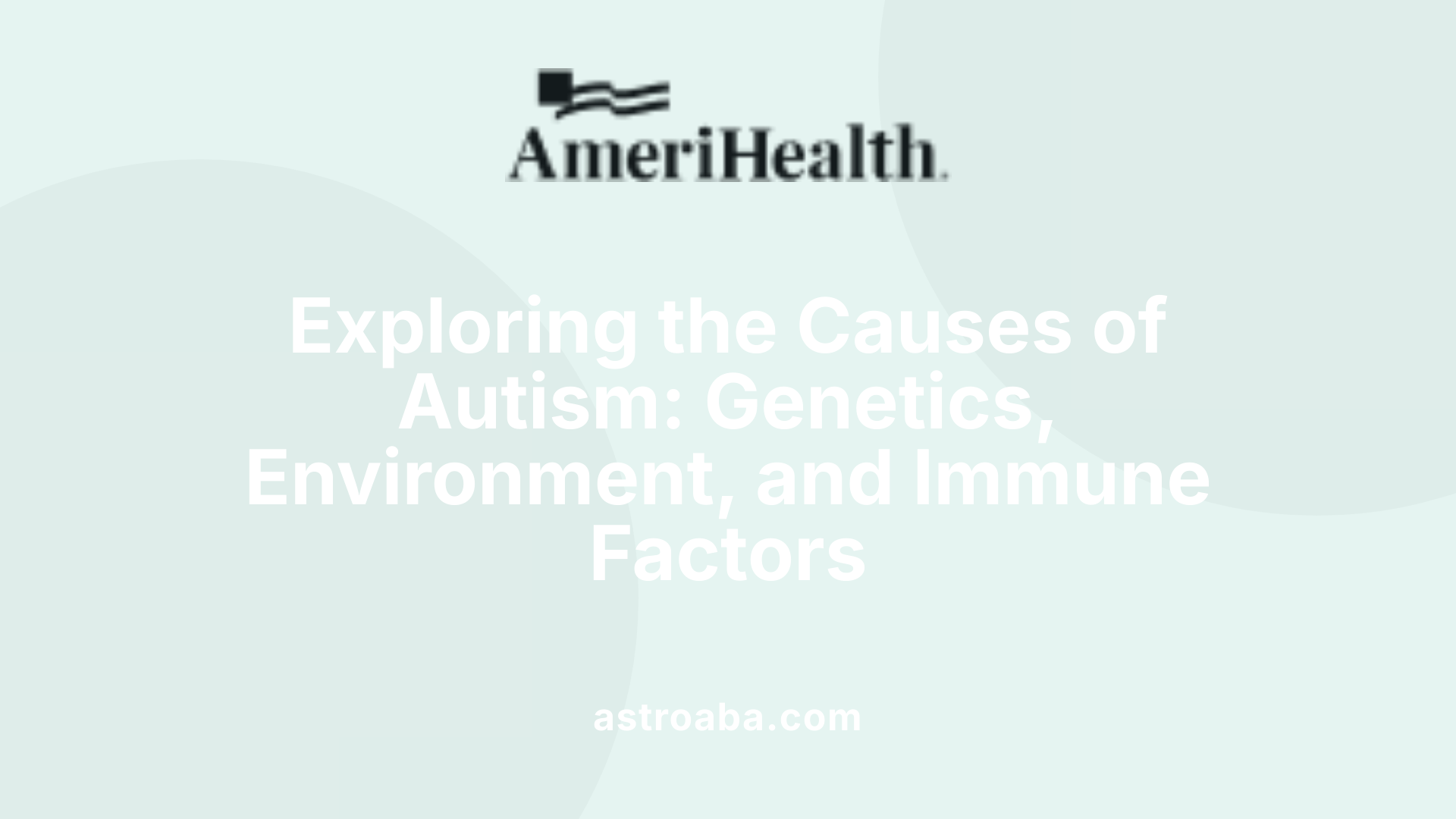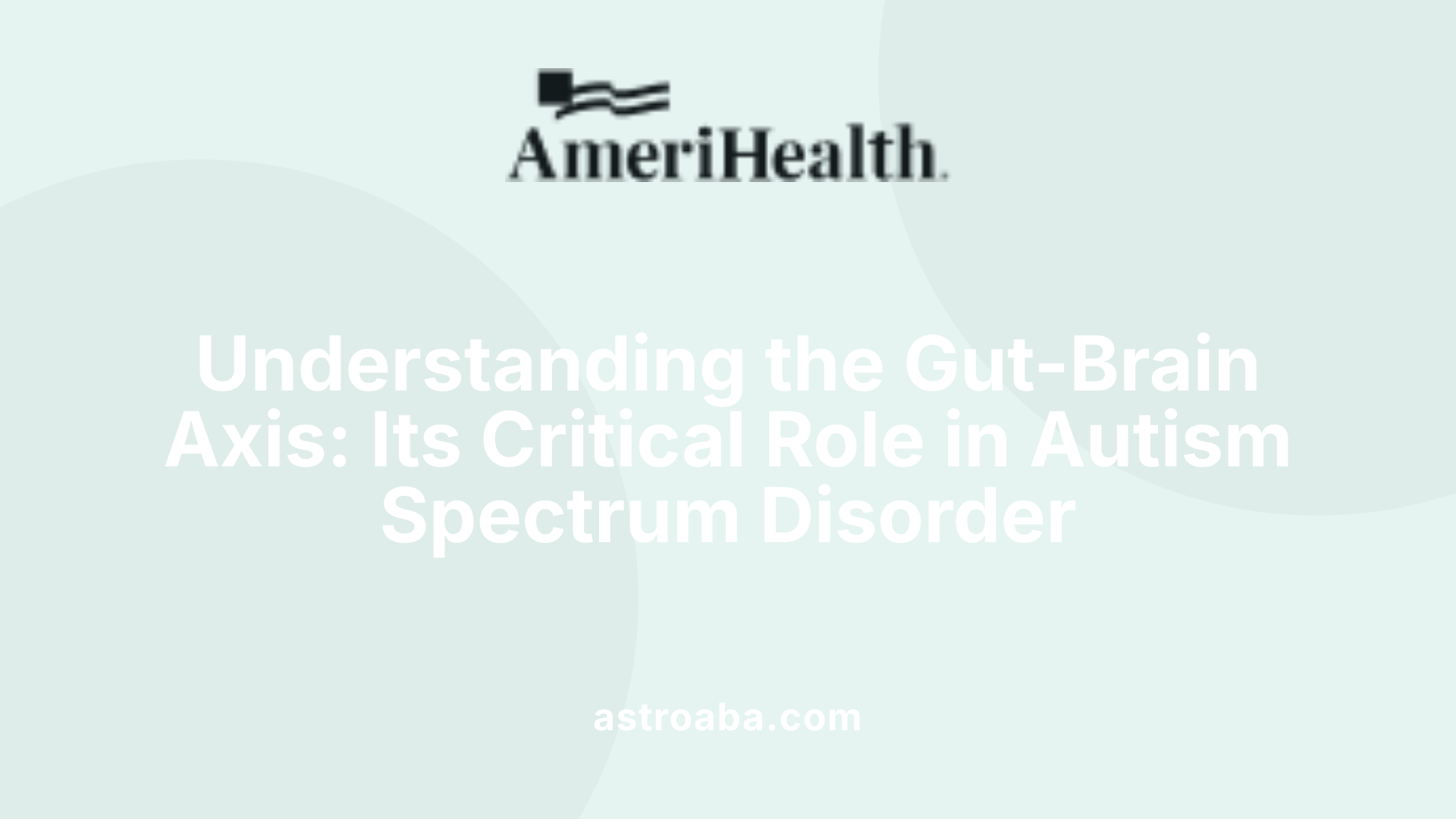Gut Health and Autism
Unraveling the Connection Between Gut Microbiota and Autism Spectrum Disorder

The Hidden Link: Gut Health and Neurodevelopmental Conditions
Emerging scientific research is shedding light on the profound influence of the gut microbiome—the trillions of bacteria residing in our digestive system—on neurodevelopmental disorders, particularly autism spectrum disorder (ASD). This article explores the complex interactions within the gut-brain axis, the biological mechanisms connecting gut health to autism, and potential therapeutic strategies. By understanding these connections, we hope to open doors for early diagnosis, personalized treatments, and improved quality of life for individuals with ASD.
Understanding Autism Spectrum Disorder (ASD) and Its Causes

What are the known causes of autism?
Autism Spectrum Disorder (ASD) arises from a complex interplay of genetic, environmental, and biological factors. While there are certain genetic variations and conditions tied to ASD, many cases involve no single genetic cause but rather a combination of influences.
Environmental elements also play a role. Factors such as complications during birth—like hypoxia or low birth weight—and having parents who are older can increase the likelihood of developing ASD. These influences can affect early brain development, which is critical during the first few years of life.
Recent research highlights the significant role of the immune system and microbiome in autism’s development. Studies in mice indicate that maternal infections can elevate levels of IL-17a, a cytokine involved in inflammation, affecting fetal brain development and leading to autism-like behaviors. Moreover, maternal immune activation can alter the offspring’s gut microbiome and immune responses, resulting in gastrointestinal issues and behavioral symptoms commonly seen in ASD.
Interestingly, interventions targeting these immune pathways, such as blocking IL-17a during pregnancy, have prevented autism-related symptoms in animal models. These findings suggest that immune dysregulation and gut microbiome imbalances are possible contributors to autism.
The understanding of ASD's origins emphasizes that disruptions in early brain development—alongside immune and microbiota alterations—are central to the disorder’s manifestation, offering new avenues for early detection and potential preventive strategies.
More about autism causes
Expanding on this, ongoing research explores how early-life gut microbiota differences, influenced by factors like delivery mode and antibiotic use, may impact neurodevelopment. Studies also indicate that specific gut bacteria and their metabolites can affect neurotransmitter production, brain function, and behavior.
This growing body of evidence supports a multidimensional view of autism, where genetic predispositions intersect with immune, environmental, and microbiotic factors, shaping the development of the disorder at multiple levels.
The Gut Microbiome's Role in Autism Spectrum Disorder

What is the connection between gut microbiota and autism spectrum disorder (ASD)?
Recent scientific studies have uncovered a notable link between the gut microbiome and ASD. Children diagnosed with autism frequently show distinct microbial profiles compared to neurotypical peers. These differences often include lower levels of beneficial bacteria like Bifidobacterium and Lactobacillus, alongside an increase in potentially harmful bacteria such as Clostridium spp. and members of the Enterobacteriaceae family.
This altered microbial composition may influence ASD symptoms through several facilitated mechanisms. Firstly, immune system dysregulation has been observed, with some children exhibiting heightened inflammatory responses linked to their gut bacteria. Additionally, impaired gut barrier integrity, sometimes called 'leaky gut,' allows toxins and bacterial metabolites to enter the bloodstream, potentially affecting brain development.
Furthermore, there is evidence that the microbiome impacts the gut-brain axis—a complex communication pathway between the gut and the central nervous system. Changes in microbiota can affect neurotransmitter production, such as serotonin, which is predominantly produced in the gut and greatly influences mood and behavior.
Scientists are also employing advanced tools like machine learning algorithms and Mendelian randomization analyses. These techniques have identified specific bacterial taxa that correlate with increased ASD risk, suggesting that the microbiome may not just be associated with, but could also play a role in, ASD development.
Therapeutic interventions are exploring methods to modify the gut microbiota to improve symptoms. Approaches such as administering probiotics, implementing microbiota transfer therapy, and dietary changes aim to restore a healthier microbial balance. While promising, these strategies require further validation through rigorous research to confirm their long-term benefits and safety.
The Gut-Brain Axis and Its Relation to Autism

What is the gut-brain axis and how does it relate to autism?
The gut-brain axis is a sophisticated communication network linking the digestive system with the central nervous system. This interconnected system involves neural pathways such as the vagus nerve, hormonal signals, immune responses, and the microbiota residing in the gut.
Within the gut, there is an extensive far-reaching network of neurons that can produce and respond to neurotransmitters like serotonin, GABA, and dopamine. Interestingly, about 90% of the body's serotonin is generated in the gut, highlighting its influence on mood, cognition, and behavior.
Research indicates that in individuals with autism, this axis can become disrupted. Up to 70% of autistic individuals experience gastrointestinal problems such as constipation, diarrhea, or abdominal pain. These gastrointestinal issues are often linked to alterations in the composition of gut microbiota, a condition known as gut dysbiosis.
Gut dysbiosis can lead to increased intestinal permeability, colloquially called "leaky gut," allowing toxins and bacteria to enter the bloodstream. Such immune activation and inflammation can impact brain function, potentially worsening behavioral and neurological symptoms associated with autism.
The mechanisms connecting gut health and brain function include production of neuroactive compounds, immune modulation, and neural signaling pathways. These processes can influence emotional stability, social behaviors, and cognitive processes, illustrating the central role of the gut-brain axis in the physical and mental health of individuals with autism.
Understanding these connections opens pathways for therapies aimed at restoring gut health through probiotics, diet, and other microbiota-targeted interventions. Current research continues to explore how supporting the gut microbiome can alleviate some of the behavioral and neurological challenges faced by those with autism.
More information about the gut-brain axis and autism can be searched using the phrase "gut-brain axis and autism."
Gastrointestinal Health's Impact on Autism Symptoms

How does gastrointestinal health impact autism symptoms and behaviors?
Gastrointestinal (GI) health plays a significant role in the development and severity of autism spectrum disorder (ASD) symptoms. Research indicates that up to 70% of children with autism suffer from some form of GI dysfunction, including chronic constipation, diarrhea, abdominal pain, and bloating. These GI issues are not just physical; they influence brain function and behavior through complex nervous and immune pathways.
The gut-brain axis, a bidirectional communication network involving the nervous system, immune responses, and hormones, connects the digestive tract to the brain. Disruptions in this system can worsen autism-related behaviors such as irritability, stress, and anxiety. For example, alterations in the gut microbiota—the community of bacteria residing in the gut—affect the production of vital neurotransmitters like serotonin, GABA, and dopamine. Since a large portion of the body’s serotonin is produced in the gut, microbial imbalances can lead to lower serotonin levels, impacting mood and communication.
Moreover, increased gut permeability, often called "leaky gut," allows toxins, bacteria, and immune-activating molecules to enter the bloodstream. This immune activation can amplify neuroinflammation and exacerbate behavioral issues associated with autism.
Interventions aimed at improving GI health, such as dietary modifications, probiotics, and therapies to strengthen the gut lining, have shown encouraging results. These approaches may reduce GI symptoms and, consequently, lessen behavioral and cognitive difficulties in children with ASD, highlighting the profound impact of gut health on autism.'}
Therapeutic Interventions Targeting Gut Health in ASD
Can improving gut health lead to improvements in autism symptoms?
Recent research strongly suggests that enhancing gut health can positively affect autism spectrum disorder (ASD) symptoms. Several interventions aim to restore a healthy balance of gut microbiota, which is believed to influence neurological development and behavior.
Fecal microbiota transplantation (FMT) has shown promising results. In studies, children with autism receiving FMT experienced around an 80% reduction in gastrointestinal (GI) symptoms and nearly a 24% decrease in core autism behaviors. A long-term follow-up indicated sustained improvements, with beneficial bacteria levels remaining elevated, pointing to lasting effects.
Probiotics and dietary changes are also under active investigation. Introducing specific strains of beneficial bacteria such as Lactobacillus reuteri and Lactobacillus plantarum can improve gut microbiome diversity and reduce symptoms. Dietary modifications, including increasing fermented foods and fibers, support the growth of health-promoting microbes.
Another notable approach is microbiota transfer therapy (MTT). This method involves a combination of antibiotics, bowel cleansing, and probiotic administration to significantly alter gut microbial composition. Studies reveal that MTT not only relieves GI symptoms but also leads to improvements in behavioral measures, with effects lasting over two years.
More information and future outlook
Emerging evidence highlights the critical role of the microbiome in the gut-brain axis. Restoring microbial balance may help modulate neuroimmune responses and neurotransmitter production, such as serotonin, which originates largely from the gut.
These therapies hold great promise, especially when applied early in development or alongside other personalized interventions. While still in the research phase, microbiota-targeted treatments could evolve into standard management strategies for autism in the future.
Visit resources like the gut microbiota therapies in autism search query for ongoing studies and latest advancements in this promising field.
Recent Scientific Findings and Future Directions

What recent studies have contributed to understanding gut microbiota and autism?
Recent research has significantly expanded our knowledge of how the gut microbiome relates to autism spectrum disorder (ASD). Studies published in reputable journals like Scientific Reports and Cell have identified clear differences in the composition of gut bacteria between children with ASD and neurotypical peers. For example, children with autism tend to have lower levels of beneficial bacteria such as Lactobacillus reuteri and Lactobacillus plantarum, which are associated with better social and physical behaviors.
Further, researchers have found that certain bacteria, including Clostridium spp., are linked with higher risks and severity of ASD, partly because these bacteria can produce neurotoxins affecting neural development. Microbiota transfer therapy (MTT), a procedure where gut bacteria from healthy donors are introduced into children with autism, has shown promising results. In particular, an 80% reduction in gastrointestinal symptoms and nearly 24% decrease in autistic behaviors were observed, with sustained improvements over a two-year period.
Metabolic studies further support this link, highlighting pathways such as tryptophan metabolism. Since a large portion of the body's serotonin originates in the gut, alterations in gut health can influence neurotransmitter levels, which are crucial for mood and behavior regulation.
What are the potential long-term effects of microbiota transfer therapy?
Long-term follow-up studies of children undergoing microbiota transfer therapy show promising signs of lasting benefits. Many children maintain higher levels of beneficial bacteria months or even years after treatment. These changes in the microbiome are associated with continued reductions in gastrointestinal discomfort and behavioral symptoms.
The therapy appears to help normalize bacterial gene functions involved in important processes like folate biosynthesis and sulfur metabolism. These pathways, often disrupted in individuals with ASD, are essential for brain development and immune function. The sustained presence of beneficial bacteria may also help preserve gut integrity and prevent future dysbiosis, potentially reducing autism severity and associated GI problems over time.
Are there biomarkers for early detection of autism based on gut microbiota?
Scientists are actively investigating early indicators within the gut microbiome that could predict autism before behavioral symptoms fully develop. Highlights include the presence of specific bacteria such as Citrobacter, which increase the risk for future diagnoses, and the absence of protective microbes like Coprococcus and Akkermansia muciniphila.
Additionally, analysis of stool samples from infants as early as one year of age reveals microbial signatures and metabolite patterns, such as levels of vitamin B and neurotransmitter precursors, that are associated with later autism diagnosis. Biomarkers like low levels of essential fatty acids and elevated harmful substances like PFAS also offer promise for early screening.
Identifying these markers early could enable preventive strategies and targeted interventions before the onset of core ASD behaviors.
Ongoing research projects and future directions
Current projects, including the European GEMMA initiative, follow hundreds of infants at risk to better understand how gut health influences neurodevelopment. These studies examine factors like antibiotic use, microbiota composition at birth, and dietary patterns. The goal is to pinpoint causal links and develop personalized therapies.
Research is increasingly focused on how dietary interventions, probiotics, and microbial implants might modify the gut-brain axis to alleviate symptoms. Advances in genetic and metabolomic technology allow for detailed analysis of gut bacteria functions and their impact on neurochemistry.
Future efforts aim to clarify whether modulating the microbiome can truly alter the course of ASD, prevent its development, or improve quality of life. The integration of microbiome analysis into early screening routines, along with tailored microbial therapies, represents a promising horizon for managing and understanding autism.
Conclusion: Towards a Holistic Understanding of Gut Health in Autism
 Research on the microbiome has revealed its significant influence on autism spectrum disorder (ASD). Studies show that maternal immune activation, particularly increased IL-17a during pregnancy, can impact fetal brain development and contribute to autism-like behaviors in mice. Additionally, the composition of an offspring’s gut microbiome—shaped by factors like delivery mode, antibiotic use, and early microbial colonization—appears to influence immune regulation and gastrointestinal health.
Research on the microbiome has revealed its significant influence on autism spectrum disorder (ASD). Studies show that maternal immune activation, particularly increased IL-17a during pregnancy, can impact fetal brain development and contribute to autism-like behaviors in mice. Additionally, the composition of an offspring’s gut microbiome—shaped by factors like delivery mode, antibiotic use, and early microbial colonization—appears to influence immune regulation and gastrointestinal health.
Alterations in gut microbiota, such as decreased levels of beneficial bacteria like Lactobacillus and Bifidobacterium, have been linked to increased autism severity. Microbial metabolites, especially those involved in the tryptophan pathway and serotonin production, also play a role in modulating brain function and behavior. Interventions like fecal microbiota transplantation (FMT) and probiotics show promise in restoring microbiota balance and alleviating symptoms.
The gut-brain axis underscores the bidirectional relationship between gastrointestinal health and neurological development. Common GI symptoms in autism, such as constipation and abdominal pain, often accompany behavioral issues, potentially exacerbated by immune dysregulation and altered vagal tone.
This integrated view suggests that early detection of microbiome imbalances could serve as biomarkers for autism risk. Personalized treatments targeting specific microbiota profiles might improve both GI and behavioral outcomes.
Does gut health impact other neurodevelopmental conditions like ADHD? Emerging research indicates that gut health may influence neurodevelopmental conditions like ADHD. Studies have found that children with ADHD often exhibit reduced gut microbiota diversity, altered profiles of short-chain fatty acids, and fungal dysbiosis, such as increased Candida albicans. Evidence suggests that early gut microbiome development, including factors like feeding methods and microbiota maturation, could impact brain development and behavior later in life. Additionally, gut inflammation and increased intestinal permeability associated with fungal imbalances may contribute to ADHD symptoms through the gut-brain axis. While these findings highlight a potential link, further research is needed to confirm causality and explore interventions like probiotics to support gut health and manage ADHD.
Looking Ahead: Integrating Gut Health into Autism Care
The accumulating evidence underscores the importance of gut health in understanding and managing autism spectrum disorder. From biological mechanisms involving immune responses and neurotransmitter production to innovative therapies like microbiota transfer, the research is moving towards a more holistic approach that includes gut biology as part of treatment strategies. Early detection through stool biomarkers and personalized microbiome modulation could revolutionize autism care, offering hope for improved behavioral, gastrointestinal, and neurodevelopmental outcomes. As science continues to untangle the complex gut-brain connection, embracing a comprehensive view of human health that encompasses gut microbiota might be the key to unlocking better quality of life for those affected by autism.
References
- Gut-Brain Connection in Autism | Harvard Medical School
- Role of Gut Microbiome in Autism Spectrum Disorder and Its ...
- Gut-brain link may affect behavior in children with autism - USC Today
- Nutrition and the Gut-Brain Connection - Autism Research Institute
- Scientists discover gut microbiome differences in children with autism
- The complex interplay between autism spectrum disorder and gut ...
- Microbiota therapy may lead to lasting beneficial changes in the gut ...
Recent articles

The Role of Prompting and Fading in ABA Therapy Programs
Enhancing Autism Interventions Through Systematic Support Reduction

The Role of ABA Therapy in Supporting Community Participation
Enhancing Lives Through Community-Focused ABA Interventions

The Role of ABA Therapy in Encouraging Initiative and Motivation
Unlocking Potential: How ABA Empowers Children to Take Initiative

How ABA Therapy Helps Children Develop Initiation and Motivation
Unlocking Potential: The Power of ABA in Fostering Child Independence

How ABA Therapy Encourages Participation in Cooperative Group Activities
Fostering Social Skills Through ABA Interventions

How ABA Therapy Supports Independent Task Initiation in Children
Empowering Children to Begin with Confidence

How ABA Therapy Helps Children Build Resilience in Challenging Situations
Building Emotional Strength Through ABA Therapy

The Impact of ABA Therapy on Reducing Anxiety in Social Settings
Transforming Social Experiences: How ABA Therapy Eases Autism-Related Anxiety

Strategies for Teaching Self-Monitoring Through ABA
Empowering Independence: Techniques to Foster Self-Monitoring with ABA

The Benefits of Combining ABA with Speech and Language Therapy
Integrating Treatment Approaches to Maximize Developmental Progress

Strategies for Teaching Cooperative Problem-Solving Through ABA
Enhancing Collaborative Skills with ABA: Proven Strategies and Techniques

How ABA Therapy Encourages Independent Participation in Daily Tasks
Empowering Autonomy: How ABA Therapy Builds Independence in Daily Life

Creating an Effective Learning Environment at Home for ABA Therapy
Building a Supportive Home Environment for ABA Success

How ABA Therapy Encourages Following Safety Rules at Home and School
Empowering Children with Autism to Follow Essential Safety Rules

How ABA Therapy Encourages Communication Using Gestures and Signs
Enhancing Social Skills with Targeted Gesture Teaching

Common ABA Therapy Techniques for Reducing Aggression
Innovative Strategies in ABA to Minimize Aggressive Behaviors

How ABA Therapy Encourages Communication Using Gestures and Signs
Unlocking the Power of Gestures and Signs in Autism Therapy

How ABA Therapy Encourages Appropriate Social Greetings
Enhancing Social Skills Through Evidence-Based Interventions

Addressing Social Anxiety Using ABA-Based Techniques
Harnessing ABA to Alleviate Social Anxiety

Famous Politicians With Autism
Celebrating Neurodiversity: Insights into Autism and Notable Figures

How ABA Therapy Can Help with Anxiety in Children with Autism
Unlocking Emotional Well-Being: The Power of ABA in Managing Autism-Related Anxiety

The Impact of ABA Therapy on School Success
Enhancing Educational Outcomes with Systematic Interventions

The Importance of Social Stories in ABA Therapy
Harnessing Social Stories to Enhance Social Skills in Autism Interventions

Mild Autism
Understanding the Nuances of Mild Autism

What Are Functional Behavior Assessments (FBA) in ABA Therapy?
Unlocking the Secrets Behind Behavior: The Power of FBAs in ABA

Early Signs Of Autism In Babies And Kids
Recognizing Early Indicators to Support Developmental Health

How to Find Funding for ABA Therapy Services
Unlocking Funding Opportunities for Autism Treatments

How to Help a Child with Autism Transition to ABA Therapy
Supporting Children Through Transition Phases in ABA Therapy

Do Autistic People Get Injured More?
Examining Injury Risks in Individuals with Autism Spectrum Disorder

How ABA Therapy Can Help with Executive Functioning Challenges
Unlocking Skills: The Impact of ABA on Executive Functioning in Autism

What is the Premack Principle in ABA Therapy?
Unlocking Motivation: The Power of the Premack Principle in ABA Therapy

Low-Functioning Autism
Understanding the Challenges and Supports for Low-Functioning Autism

Low-Functioning Autism
Understanding the Challenges and Supports for Low-Functioning Autism

How ABA Therapy Can Help with Playdates and Social Events
Unlocking Social Success: How ABA Therapy Facilitates Playdates and Community Engagement

How ABA Therapy Can Address Impulse Control Issues
Mastering Behavioral Growth: The Power of ABA in Impulse Control

Book, Movie, and TV Characters on the Autism Spectrum
Enhancing Understanding Through Fictional Portrayals

Book, Movie, and TV Characters on the Autism Spectrum
Enhancing Understanding Through Fictional Portrayals

The Role of Visual Supports in ABA Therapy
Enhancing Autism Interventions with Visual Supports

What Is Pervasive Developmental Disorder
Understanding the Spectrum of Developmental Challenges

How ABA Therapy Helps with Emotional Regulation
Empowering Emotional Resilience in Children with Autism

What is Task Analysis in ABA Therapy?
Unveiling the Foundations of Task Analysis in ABA Therapy

How ABA Therapy Can Improve Play Skills
Unlocking Growth: The Power of ABA in Enhancing Play Skills

Air Pollution and Autism
Unveiling the Environmental Impact on Developing Minds

How ABA Therapy Can Help with Bullying Prevention
Building Respect and Resilience Through ABA

How ABA Therapy Can Be Used to Teach Problem-Solving Strategies
Empowering Individuals with Autism Through Targeted Problem-Solving Skills

Can Autistic People Work?
Unlocking Potential: The Realities of Employment for Autistic Individuals

How ABA Therapy Can Help with Homework and Academics
Empowering Academic Success with ABA Therapy

Common Myths About ABA Therapy Debunked
Unmasking Autism Treatment: The Truth About ABA Therapy

Does Aluminum Cause Autism?
Unraveling the Link: Aluminum and Autism Spectrum Disorder

How ABA Therapy Can Support Emotional Expression and Understanding
Unlocking Emotional Growth in Autism Through ABA Therapy

The Role of ABA Therapy in Helping Children Learn Road Safety
Empowering Safe Journeys: How ABA Therapy Fosters Road Safety Skills in Children

The Role of Group ABA Therapy in Social Development
Enhancing Social Skills Through Collective Strategies

What Is Autistic Burnout?
Understanding the Hidden Struggle of Autistic Burnout

How Do You Get An Autistic Child To Keep Their Shoes On?
Mastering Comfort and Compliance with Shoes for Autistic Children

The Role of ABA Therapy in Addressing Food Aversions and Picky Eating
Transforming Mealtimes: How ABA Therapy Supports Children with Autism

How ABA Therapy Can Assist in Reducing Perfectionism and Anxiety
Harnessing Behavioral Science to Ease Perfectionism and Anxiety

What Is Defeat Autism Now?
Unveiling the Roots and Realities of the DAN Movement

How ABA Therapy Can Help Children Develop Conflict Resolution Skills
Building Bridges: Empowering Children with Conflict Resolution Skills through ABA

OCD vs. Autism
Unraveling the Complex Relationship Between OCD and Autism

Temper Tantrums A Sign Of Autism
Understanding the Complex Relationship Between Temper Tantrums and Autism Spectrum Disorder

How to Pass the BCBA Exam
Your Ultimate Guide to Success in the BCBA Exam

Autism and Addiction's Close Connection
Unraveling the Complex Interplay Between Autism and Substance Use

Autism Facial Expressions
Decoding Emotions: The Complex World of Facial Expressions in Autism

How ABA Therapy Can Help Reduce Anxiety Around Doctor and Dentist Visits
Transforming Medical Experiences for Children with Autism

How ABA Therapy Can Help with Navigating Social Media Responsibly
Empowering Safe Online Engagement for Children with Autism through ABA

How to Choose an Autism Charity
Navigating the Spectrum of Support: A Guide to Selecting the Right Autism Charity

What is Precision Teaching in ABA Therapy?
Harnessing Data-Driven Strategies for Skill Mastery

Autism and Obesity
Understanding the Overlap: Autism and the Rising Concern of Obesity

Individualized Education Programs (IEPs) for Autism
Supporting Success: A Comprehensive Guide to IEPs for Children with Autism

How to Integrate ABA Therapy into Everyday Routines
Transforming Daily Life with ABA Strategies

What is Shaping in ABA Therapy?
Understanding the Core of Behavior Shaping in Autism Interventions

Autism vs. ADHD
Understanding the Distinction and Overlap of Neurodevelopmental Disorders

Is RBT Certification Worth It?
Unveiling the Value of RBT Certification in the Field of ABA

How Negative Reinforcement Works in ABA Therapy
Unlocking the Power of Negative Reinforcement in Behavioral Therapy

How to Advocate for ABA Therapy Services in Schools
Navigating Advocacy for School-Based ABA Therapy

How ABA Therapy Can Address Impulsivity in Children
Transforming Child Behavior: The Power of ABA Therapy Against Impulsivity

Understanding the Different Types of ABA Therapy Programs
Exploring the Spectrum of ABA Therapy Approaches

How ABA Therapy Can Address Regression in Autism
Understanding Regressive Autism and the Role of ABA Therapy

High Functioning Autism And Anger
Understanding Emotional Challenges in High-Functioning Autism

Autism and Puberty
Understanding Puberty in Autistic Youth: Challenges and Support Strategies

Challenging Autism Behavior Problems
Navigating the Complex Landscape of Autism-Related Behavioral Challenges

How ABA Therapy Can Help with Sleep Problems
Transforming Bedtime Routines with Evidence-Based Approaches

How ABA Therapy Can Help Improve Cooperation and Compliance
Fostering Respectful Engagement: The Role of ABA in Enhancing Cooperation and Compliance

Eating Disorders And Autism
Unraveling the Complex Relationship Between Autism and Eating Disorders

How Schedules of Reinforcement Work in ABA Therapy
Mastering Reinforcement Patterns to Foster Behavior Change

How to Incorporate ABA Therapy into a Homeschooling Program
Transforming Homeschooling with Evidence-Based Strategies

What Are the Most Common Misconceptions About ABA Therapy?
Unveiling the Truth Behind ABA Therapy: Myths vs. Facts

What is Demand Fading in ABA Therapy?
Demystifying Demand Fading in ABA Therapy

What Are ABA Assessments and How Do They Work?
Understanding the Foundations of ABA Assessments

What is an AAC Device for Autism?
Unlocking Communication: The Power of AAC Devices for Autism

How ABA Therapy Can Help Children Understand and Express Emotions
Enhancing Emotional Understanding Through Evidence-Based Interventions

How To Prevent Autism
Emerging Strategies to Reduce Autism Risk in Children

How ABA Therapy Can Improve Verbal and Nonverbal Communication
Unlocking Communication: The Power of ABA Therapy for Children with Autism

Natural Environment Teaching (NET): How It Helps with Skill Generalization
Unlocking Practical Learning in Natural Settings

What Is Play Therapy For Autism?
Unlocking the Potential of Play in Autism Therapy

How ABA Therapy Can Improve Fine and Gross Motor Skills
Enhancing Movement and Independence Through ABA Strategies

Calming Strategies For Kids With Autism
Understanding and Supporting Calmness in Children with Autism

Autism Evaluation
Comprehensive Insights into Autism Assessment and Diagnosis

How to Support Your Child's ABA Therapy at Home
Empowering Your Child’s Development at Home with ABA Support

Autism Prevalence Increases in Arizona
Rising Autism Rates Signal Changing Landscape in Arizona

